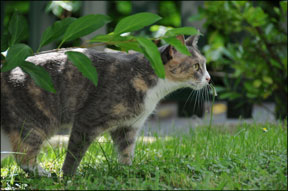We live in a litigious society. We have laws governing birth, death and the taxes in between, so its no surprise that we also have a host of laws relating to the animals weve taken into our homes. At the federal level, laws generally address issues such as the safety of pet food, the impact of hazardous products on pets, evacuating and transporting pets during emergencies and Bev Caldwell 288 regulating the use of animals in research. But most of the laws directly affecting our pets are made at the state and local level. These ordinances can differ by city, township and county, and pet owners should contact local officials when getting a new pet or moving to a new place to find out what possible laws pertain. Licensing Laws. Pet licenses serve a variety of functions. At the simplest level, the metal tag issued with a license – which is attached to a pets collar – provides identification so the owner can be contacted if the pet is lost or impounded. The requirement to license a pet is also a major front in the war to control rabies, since owners must provide proof that their pets have been vaccinated against the disease before a license will be issued. Some municipalities charge a variable licensing fee based on whether a pet has been spayed or neutered, with the fee for an unaltered pet set high to encourage owners to sterilize their pet. In some locations, licenses are sold by the town clerk; in others, licensing is handled by a separate animal control department. The fee you pay for a license may be used to provide care for homeless animals, and may also fund investigations of animal cruelty, abuse, abandonment and neglect. Leash and Impound Laws. Very few places actually have leash requirements for cats. However, even those localities which dont have leash laws may have rules prohibiting cats from running free on public land. Thus your pet may still be at risk of impoundment if it is found to be off your property and not under your control. Impound laws are designed to protect the public from the hazards of unrestrained pets. These laws are distinct from leash laws in that they empower officials to claim animals which are not on a leash and/or under owner control. Impound laws are usually made at the state level. For example, in Ohio impounded stray dogs with no identification must be kept at least three days to give owners time to claim them – but cats are not considered personal property under Ohio law and therefore have no such protection. Animal control is often contracted out by the municipality; in many locations, for example, the local SPCA provides impoundment services and enforces the local animal control laws. Be warned: Even if your cat has a license when it is picked up by animal control, you will probably still be charged for the impounding cost. If your cat does not have a license, additional fines may be levied. Spay/Neuter Laws. In an effort to decrease the number of cats euthanized each year in shelters, many municipalities require that all resident pets are spayed or neutered (medical exemptions may be made). Some locations only require pets adopted from shelters to be sterilized; other localities include cats acquired from pet stores in their legislation. The age by which spaying or neutering is required varies, although six months is common. Many locations will forcibly sterilize any pets which are impounded – and then charge the owner for the procedure if they claim their pet. Density Laws. As concern about the environmental impact of pets increases, and as urban density increases in many parts of the country, more and more municipalities are passing laws that limit the number of pets in a household. Such laws are intended to ensure that pet owners do not have more animals than they can handle. Municipalities see density laws as a way to control noise, waste and nuisance issues. Density laws also create a distinction between family pets and animals kept for breeding, since breeders fall under zoning and other regulations more stringent than those relating to family pets.



